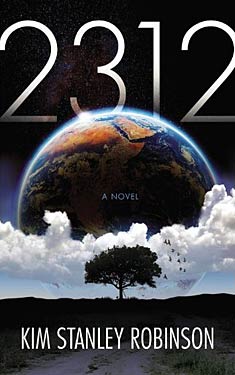Kim Stanley
Robinson
Completed 5/26/2019,
Reviewed 5/26/2019
3 stars
I’m not
really a big fan of Kim Stanley Robinson, but I do recognize that his books are
really well written. The prose is usually
outstanding and the amount of research and thought that goes into his books is
extraordinary. 2312 is no
exception. I was continuously amazed at
what he was writing about and how he was writing it. However, I thought this book was short on
plot and character development. It took
a long time to get around to advancing the plot, and I didn’t think it was all
that interesting. The characters were sort
of interesting, but not very likeable. I
thought the real point of this book was a love letter to the solar system and
positive thoughts on its colonization if we put our minds to it.
 The very
basic plot concerns Swan Er Hong, the granddaughter of Alex, the Lion of
Mercury. When Alex dies, Swan is more or
less thrust into some of Alex’s roles as a thinker and coordinator of efforts
to advance living in the solar system.
However, Alex hardly kept any notes and left little for Swan to
research. Still, Swan becomes embroiled
in trying to figure out who is sabotaging cities and operations on the planets. Wahrum, an ambassador from Saturn and Inspector
Jean Genette work with Swan to get to the bottom of this mystery.
The very
basic plot concerns Swan Er Hong, the granddaughter of Alex, the Lion of
Mercury. When Alex dies, Swan is more or
less thrust into some of Alex’s roles as a thinker and coordinator of efforts
to advance living in the solar system.
However, Alex hardly kept any notes and left little for Swan to
research. Still, Swan becomes embroiled
in trying to figure out who is sabotaging cities and operations on the planets. Wahrum, an ambassador from Saturn and Inspector
Jean Genette work with Swan to get to the bottom of this mystery.
Swan is the
main character. She’s 135 years
old. She’s a hermaphrodite, but uses the
she/her pronouns. Many people are hermaphrodites
in the future, and many people live to be well over one hundred years old. Despite her age, Swan acts very childish in
many respects. I found it rather
annoying, particularly in the beginning of the book. One would almost have guessed she was a
teenager by how she reacts to situations.
I found it difficult to like her, let alone identify with her because of
her immaturity. Yet, she’s been a mother
and a father, but certainly doesn’t act like she’s ever been a parent.
Wahrum is
also a hermaphrodite and has fathered and mothered children. He’s a spritely 115-ish. He’s much more mature than Swan, but the two
eventually end up romantically entwined.
But like the plot, this is slow in developing through the novel.
The real
relationship in the novel is the romance Robinson has for the solar
system. Most of the book describes the
inhabited planets and moons and how they were terraformed and settled. It’s really good reading. I found it much more interesting than the
plot or the characters. Robinson also
spends time talking about how the Earth has changed with the effects of climate
change and the animosity the eleven billion people still living on earth feel
toward the spacers, who they consider deserters of the bad situation.
The book felt
very long. I think this was due to the
fact that very few chapters for the first two thirds of the book feel like they
advance the plot. There are a lot of scenes
with Swan and Wahrum, but they don’t always have to do with the sabotage story
line or their relationship. Yet, they
are very readable. The form of the book
is very interesting, with strange stream of consciousness lists, extracts that
seem to come from papers and research adding color to the world building, and “quantum
walks” which are also stream of consciousness, but much stranger. I think those had to do with the AI implanted
in Swan’s head. The form reminded me of Stand on Zanzibar by John Brunner. In fact, a
lot of reviewers claim there are many references to older science fiction
authors, particularly Heinlein, though I missed most of those.
I was going
to give this book four stars out of five when I got the end, but I spent most
of time reading it thinking it was only a three-star book. I recognized that I really liked reading the
prose and was almost always fascinated by the astronomical and ecological
passages. However, I just couldn’t
forgive it for not having such a basic plot and so little character development. So I settled on three stars.
No comments:
Post a Comment